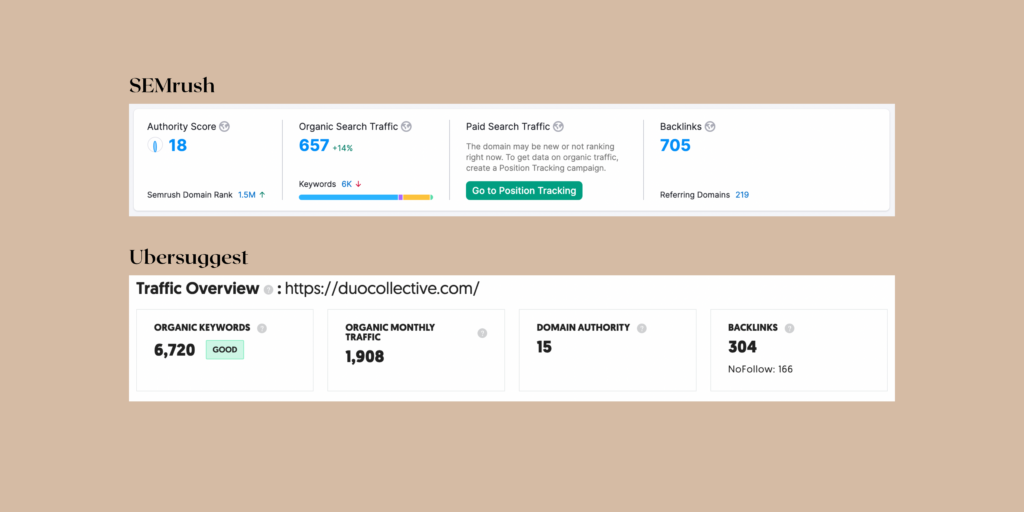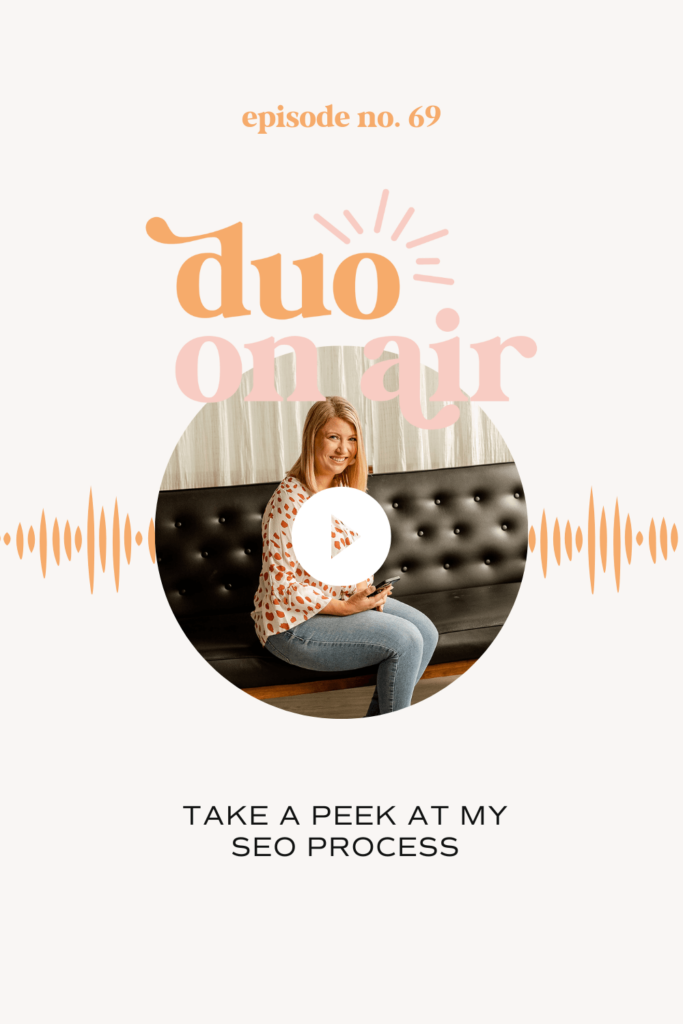Apple Podcasts | Spotify
Updated January 2025
Have you ever wondered how we audit our client’s website and overall SEO performance? Well, today’s your lucky day! On this podcast episode, we’re breaking down our SEO process for businesses of all sizes.
We originally published this episode in May 2023 and reran it in January 2025. At the end of the day, the foundation for SEO is the same. You grow your website and SEO through high-quality content and building authority with search engines over time. We’ve been using this SEO process for several years and our clients have seen amazing results! No two SEO projects are the same— and that is why we love this work so much!
Start by Answering These Two Questions
So, before we dig in to Abbey’s approach, we start by asking our clients to answer two simple questions: (grab a pen and paper and try this for yourself, too!)
- Who are your competitors? (guess what, your competition on search is normally very different than the ‘Gram!)
- Who do you dream and aspire to become? (hello brand strategy work!)
These two questions can help us dig into specific keyword research strategies and better understand the competitive space within their industry. Plus sometimes those dream clients we aspire to be or compare ourselves to have horrible SEO. Seriously! You might just think they are crushing it because they have a large Instagram following when in reality, Google barely knows they exist.
Step number one to our SEO process is always laying some ground work through a discovery questionnaire. Now, let’s dig into what we do next. Here is an exact breakdown of how we approach our various client’s SEO audits. There are normally three opportunity buckets our clients usually fall into. This helps determine where we should spend the most time researching and optimizing. Chances are, you will, too. So follow along and see where you might need to focus on growing your SEO next.
Our SEO Process for Auditing
The first thing we do with every website is look at its overall SEO performance: organic traffic, keywords indexed, backlinks, and domain authority. Let’s break each of these down.

As you can see above, depending on the SEO tool you use, the measurements can vary. This is because each tool uses a different methodology to calculate each metric. Remember, your Google tools are the only tools that will be 100% accurate. The key here is to use the same tool when comparing yourself and your competition. You can see above how each tool showcases all four of those metrics. Now, let’s talk about what each one of these means.
Organic Traffic
How much traffic your website brings in solely from search engines (this does not include anything paid, from social, emails, etc. It’s just search engines like Google, Yahoo, Bing, etc.).
Keywords Indexed
Of all the words written on your website, what keywords do search engines know about and therefore have indexed in their system? We like to explain it as Google’s file cabinet. If your words aren’t indexed in the right folders, Google won’t be able to serve them up as a result when someone searches for it.
Backlinks
These are all of the links of your website that live on someone else’s website. If your number is zero or maybe you are just looking for a challenge; here’s how you build a backlink strategy!
Domain Authority
A search engine ranking score developed by Moz that predicts how likely a website is to rank on a search engine result pages (also called an SERP). The higher, the better. It dictates how authoritative you are on the topic or industry you serve. And this takes the absolutely longest to grow. If you grow a few points a year, that’s a good thing!
Now that we understand these metrics, this now gives us a baseline for what we need to do next. Where we need to focus our energy and efforts for the biggest SEO return.
Common SEO Audit Scenarios and Our Approach
These are some areas we often point out to clients in our SEO process, sometimes on our initial meet-and-greet discovery call! You may be lacking in these areas, too! So let’s chat about what they mean and how you can easily fix them.
Low keywords indexed and low organic traffic.
One, you aren’t using enough keywords on your website. Word count matters! Or two, search engines don’t know about you yet. In both of these cases, one of our first priorities is to install Google Search Console, manually crawl your pages, and upload your sitemap. We also make sure to include a minimum of two hours of SEO copy into our main SEO audit package to account for low word count and lack of high volume keywords.
Keywords indexed are high, but organic traffic is low.
This is where we can tell right away that you aren’t writing for the right keywords that people are searching for. Or you are writing for extremely niche keywords. This is likely why you aren’t seeing traffic. Our goal here is to focus on uncovering exactly who your audience is, what they are searching for, and how we can find higher volume keywords to help you grow your search presence.
Keywords and organic traffic are great, but domain authority is low.
Usually when your keywords and traffic are great, but domain authority is still showing low, we will notice a lag in overall backlinks. This is where a strong backlink strategy comes into play— once again something we include in every SEO audit package.
Sometimes this also means that our client’s are blogging and writing for high traffic keywords, but they aren’t connecting with their audience and therefore converting. Search engines are smart. They know when you are simply writing to drive traffic for a trending keyword or authentically writing to connect with your audience.
What SEO Tools Do I Use?
I use a mix of both Ubersuggest and Semrush. Ubersuggest is what we frequently recommend to fellow entrepreneurs and small business owners who are managing their own SEO or a small number of clients. It’s an amazing tool at an affordable price that allows you to conquer your organic SEO growth. We’re kind of obsessed with their new AI Writer tool when it comes to writing your metadata.
We made the investment in Semrush because of our high quantity of SEO clients and the ability to dig into deeper pages with each audit. Based on the size of our clients, sometimes Semrush can go deeper. Our favorite parts of this platform so far is the link building tool, the ease and use of their keyword manager and lists along with the listings management feature for local SEO growth.
There are a lot of opinions out there about which tool is the best. In our opinion, as long as you are measuring your growth somewhere and understand what the metrics mean, then you will grow in the right direction. So stop stressing about your budget and what the experts are saying… just get to work!
Our biggest SEO takeaway when DIY-ing your own growth
Every project is different, big or small, but we always let the numbers do the talking. We touch every metric in our SEO process, even if it’s trending up, so the client fully understands their website performance. Better yet, how to optimize it moving forward.
Our biggest takeaway is to know your numbers and track the growth. SEO isn’t a one-and-done thing. Optimizing your website is one step, but continued content creation and backlink outreach are so important to sustain and continue to grow your overall domain authority. We hope you enjoyed learning about our SEO process!
If you liked today’s episode on The Duo On Air Marketing Podcast, don’t forget to leave us a review & subscribe!

More From The Duo
Sign Up for Tuesday Tips and Sips Newsletter
Abbey Oslin and Courtney Petersen are Minnesota-based marketing experts, educators, and co-founders of boutique marketing agency Duo Collective, which specializes in SEO, social media strategy, and branding for small business owners and creative entrepreneurs. To learn more about Duo Collective, or to inquire about working with our team, head over to www.duocollective.com.
To inquire about being a guest on Duo On Air, please fill out this application form.
And to submit a topic or a question for next week’s episode, send us a DM on Instagram! See you on Monday!


+ show Comments
- Hide Comments
add a comment